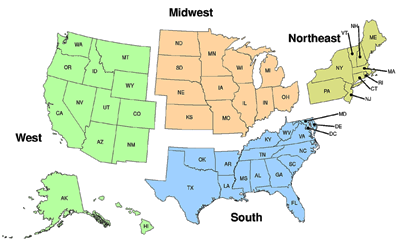Census Regional Trends for Common Human Coronaviruses
Updated April 25, 2024
On May 8, 2024, the data previously included on this page was moved to the NREVSS Interactive Dashboard.
The following surveillance information only includes four common human coronavirus types (229E, NL63, OC43, and HKU1), not SARS-CoV2 the virus that causes COVID-19. For more information on these common coronavirus types, visit the Human Coronavirus Types webpage. Data for SARS-CoV-2 the virus that causes COVID-19 testing are available on the COVID Data Tracker.
Participating laboratories report weekly to CDC the total number of coronavirus tests performed that week, and the number of those tests that were positive. Because reporting delays may be expected for some laboratories, data shown for the more recent weeks may be less complete than others. Each point on the trend graphs below displays the average number of coronavirus tests that were performed by census region, and the average percent of those that were positive from three adjacent weeks: the specified week, and the weeks preceding and following it. This is also known as a centered 3-week moving average.
In the United States, annual community outbreaks of coronavirus infections typically occur during late fall and winter. There may be variation in the timing of outbreaks between regions and between communities in the same region.

About Census Regions and Divisions [1 MB, 2 pages]
Northeastern United States Census Region
Table: Northeastern United States percent positive coronavirus tests, by week
Midwestern United States Census Region
Table: Midwestern United States percent positive coronavirus tests, by week
Southern United States Census Region
Table: Southern United States percent positive coronavirus tests, by week
Western United States Census Region
Table: Western United States percent positive coronavirus tests, by week